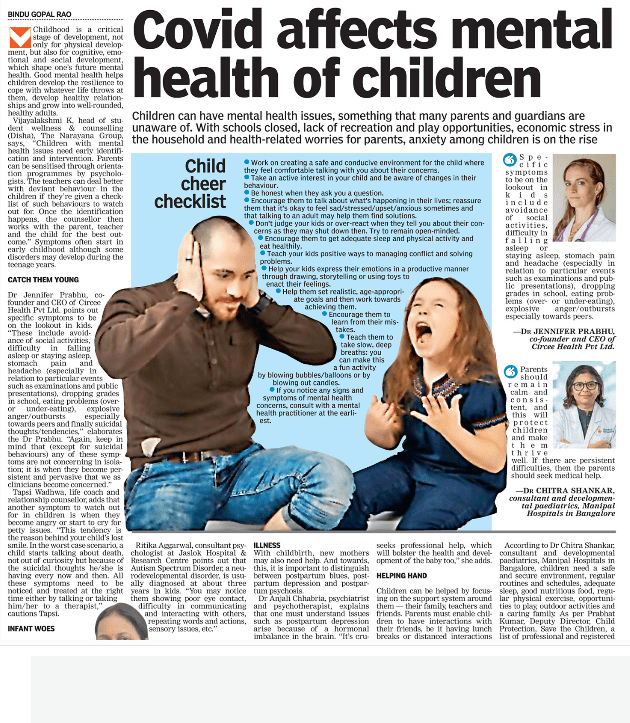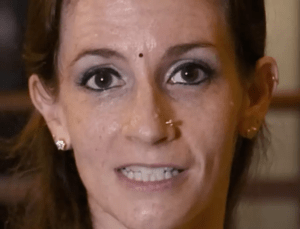
Why is it important to recognize mental health issues in children under 12 years?
Parents should first realise that occasional anxiety, low mood, anger or worry are a normal part of every child’s development. However, these issues become a disorder when they are persistent and cause significant distress, thereby interfering with the child and family’s day to day life. It is important to recognise and treat early, because mental health disorders in children are unfortunately associated with poor educational performance as well as functional impairments that often extend into adulthood.
What are the symptoms to look out for?
Mental health disorders such as anxiety, depression, obsessive compulsive disorder (OCD), etc- can present in varying forms in different individuals. Specific symptoms to be on the lookout for- avoidance of social activities, difficulty falling asleep or staying asleep, stomach pain and headache (especially in relation to particular events such as examinations, public presentations), declining grades in school, eating problems (over or under-eating), explosive anger/outbursts especially towards peers, and finally suicidal thoughts or tendencies. Again, keep in mind that (with the exception of suicidal behaviours) any of these symptoms are not concerning in isolation, it is when they become persistent and pervasive that we as clinicians become concerned.
How can this be seen in children below 3? Is it hard to see mental issues at that age?
It is difficult to diagnose these disorders in young children and toddlers, as they tend to have, at baseline (normal), extreme swings in mood. This is absolutely normal for the age group. It follows, then, that any parent with concerns should keep in close contact with their child’s pediatrician, who will know what subtle signs to monitor for as he or she grows up. However, one phenomenon that can be seen in the very young is something called ‘selective mutism’. These children become completely silent in situations that they perceive as stressful- such as school, in large social gatherings, with certain family members or acquaintances, etc. Conversely, they speak and interact perfectly with their close family at home. Fortunately, this disorder is very responsive to early intervention and physical/occupational/speech therapy.
How does one help new moms with postpartum mental health issues?
Post-delivery (and even peripartum [during pregnancy]) mental health disorders are much more common than previously thought- studies have shown that up to 10% of women will develop some aspect of this, and honestly, it’s probably a larger number. In fact, among patients with postpartum depression, onset occurs before or during pregnancy in roughly 50 percent of women. It is extremely important for mothers, their doctors, as well as their family and friends to be aware of the symptoms to look out for. It is often because they are so sleep-deprived, that these women may not even be aware that they are slipping into anxiety and/or depression- and thus, external recognition is paramount. Some common signs are- excessive fatigue, poor appetite, indifference to the baby’s well-being, excessive anger/short temper towards spouse and other close family, difficulty in concentration and completing tasks, oversleeping, excessive crying in response to seemingly small incidents, and social withdrawal. The most important aspect of treatment for postpartum anxiety and depression is prompt recognition of symptoms- this has the potential to save lives (both mom and baby!). Thankfully, this is a very treatable disease with mental health therapy and, occasionally medication [usually short term]. And finally, just as important as recognition, is acceptance that this is a very common medical condition and is not the mother’s fault!!
How can children be helped?
Just as it’s important to recognize symptoms of post- and peripartum mental health issues, the same can be said of the importance in children. It is imperative to distinguish the difference between simple poor behaviour and an actual medical issue. Please do not be ashamed to discuss such concerns with your pediatrician- this is the first step in getting your child the help he or she needs. Usually, the pediatrician will then refer you to a mental health therapist or psychiatrist for formal evaluation. The wonderful thing about children’s brains is that they are very malleable- and with early intervention and treatment, most kids will recover and go on to lead normal and productive lives.
Anything else on the topic?I just want to reiterate the fact- across all mental health disorders- whether children or adults (especially peri- and postpartum women)- that these are all actual diseases. Diseases that are a direct result of a chemical/hormonal imbalance in the body. The person cannot control what is happening to them. It is not their choice! Just as a person with cataracts or cancer or hypothyroidism cannot control. However, with open communication between parents, children and the pediatrician/family doctor, these phenomena can be recognized early and effectively treated. Please, please do not shame family and friends with mental health issues. For, sometimes, an “invisible” disease can be the most serious of all!
As reported in the following news outlets (click to visit):









